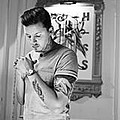Stephen Manderson aka Professor Green, reveals how his Dad's suicide shaped him, his recent documentary on mental health and opening up to wife Millie Mackintosh of Made In Chelsea, in an exclusive interview with The Huffington Post UK.
"It is (about) people seeing a vulnerable side. You look at all the archetypal male superhero stories, even Superman, Spiderman and a huge part of their story is vulnerability. Why can't we take from that?"
"They are superhuman and our idea of a 'proper' man is someone who doesn't show that. I think we need to redefine our role in society and change that feeling of inadequacy."
On the documentary:
"I thought, if I'm going to do this, I'm going to be honest," he continues. "There were times when I probably could have held it together but who was I holding it together for? It wasn't helping me to do that."
On opening up to his wife, Millie Mackintosh of Made In Chelsea:
"I talk to her a lot about how I feel and where I'm at but it's not… her job to fix anything."
"I talk more about how I'm feeling. After Newsnight, the first thing I did in the morning was an interview with Five Live and it was a whole day. I'd been building myself up a bit because I knew everyone was going to see it and I'd have to deal with the response."
"And I came out and I said to her: 'You know what, when I come home, I just need some company.' It still took a lot for me to ask, but I did it.
"I never ask her to solve my problems. If I tell her I'm down, it's not 'make me happy'. It's 'can we go and walk the dog'. It's not like it is with my therapist. They have an understanding of how things work."
Manderson describes his relationship with the documentary as "one of the weirdest things in the world", although his is immensely appreciative of the impact.
"On one hand, I'm proud of getting through it, I'm happy with the effect it has had, the noise it has made, the dialogue it has opened up, but it was a horrible time for me. There were times when I questioned myself – there were times when I asked myself why I was doing this."
"Life is difficult when you're a kid – whether you're missing a parent for this reason or that reason – my mental health problems started as a child. I thought I had a tummy ache but I didn't know how to say I was anxious, because that's what that was.
"They stuffed cameras down my neck looking for what was wrong with my stomach when actually it was just anxiety."
"(When I heard my dad died) I went through the whole spectrum within about two minutes. I punched a wall, screaming, crying – why would he do this, all this anger, he's so selfish and how could he take this opportunity away from me, and when it landed on me, I realised I was thinking about myself.
"Then I realised how selfish I was being by thinking he had been selfish because then I thought oh my god, what was he going through to do what he did. And then came: I want to know what he was going through, and then I realised, no I don't.
"Because the only way I could understand was by being in that position and that is not somewhere that I ever want to be."
Professor Green news










